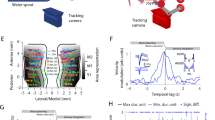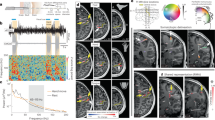Summary
The posterior parietal cortex (areas 5 and 7) in monkeys has been described as a higher association cortex and as such, area 5 has been attributed a complex somaesthetic function. More recently, a role in the formation of motor commands has been postulated for these two cortical areas. We have been particularly interested in the role area 5 neurons may have in movement initiation. Single neuron activity was recorded in area 5 during the performance of a trained forelimb movement in monkeys and neuronal responses which occurred prior to movement were observed. In the present report, we have examined the neuronal discharge data trial by trial using a technique of data analysis which enabled us to separate the changes in neuronal activity into stimulus- or movement-related responses. Both stimulus- and movement-related responses were identified. The stimulus-related responses were not simple sensory responses since they were also influenced by the timing of the onset of movement. These results suggest that certain area 5 neurons may be involved in the linking of sensory inputs with motor outputs. Cerebrocerebellar loops may be a pathway in this linkage. The latencies of the movement-related responses were such that corollary discharge from the motor cortex may have played a role in this activity. Such corollary discharge may be a form of information used by the animal to execute movement in the absence of peripheral feedback.
Similar content being viewed by others
References
Aldridge JW, Anderson RJ, Murphy JT (1980) The role of the basal ganglia in controlling a movement initiated by a visually presented cue. Brain Res 192: 3–16
Allen GI, Tsukahara N (1974) Cerebrocerebellar communication systems. Physiol Rev 54: 957–1006
Beaton R, Miller JM (1975) Single cell activity in the auditory cortex of the unanesthetized, behaving monkey: correlation with stimulus controlled behavior. Brain Res 100: 543–562
Brown MW, Horn G (1978) Context dependent neuronal responses recorded from hippocampal region of trained monkeys. J Physiol (Lond) 282: 15–16P
Buser P, Pouderoux G, Mereaux J (1974) Single unit recording in the caudate nucleus during sessions with elaborate movements in the awake monkey. Brain Res 71: 337–344
Caan W (1977) Recording from the auditory system in the awake monkey. J Physiol (Lond) 272: 87P
Chapman CE, Busby L, Spidalieri G, Lamarre Y (1983) Sensorimotor properties of neurons in area 5 during conditioned arm movements in the monkey. Soc Neurosci Abstr 9: 490
Chapman CE, Spidalieri G, Lamarre Y (1982) A study of sensorimotor properties of dentate neurons during conditioned arm movements in the monkey. Soc Neurosci Abstr 8: 830
Commenges D, Seal J (1985) The analysis of neuronal discharge sequences: change-point estimation and comparison of variances. Stats in Medicine (in press)
Evarts EV (1981) Role of motor cortex in voluntary movements in primates. In Handbook of physiology. The nervous system. American Physiological Society, Bethesda, Sect I, Vol II, pp 1083–1120
Evarts EV, Fromm C (1977) Sensory responses in motor cortex neurons during precise motor control. Neurosci Lett 5: 267–272
Evarts EV, Thach WT (1969) Motor mechanisms of the CNS: cerebrocerebellar interrelations. Ann Rev Physiol 31: 451–498
Fabre M, Rolls ET, Ashton JP, Williams G (1983) Activity of neurons in the ventral tegmental region of the behaving monkey. Behav Brain Res 9: 213–235
Gandevia SC (1982) The perception of motor commands or effort during muscular paralysis. Brain 105: 151–159
Georgopoulos AP, Caminiti R, Kalaska JF (1984) Static spacial effects in motor cortex and area 5: quantitative relations in a two-dimensional space. Exp Brain Res 54: 446–454
Goldschalk M, Lemon RN, Nijs HGT, Kuypers HGJM (1981) Behaviour of neurons in monkey peri-arcutate and precentral cortex before and during visually guided arm and hand movements. Exp Brain Res 44: 113–116
Goldberger ME, Murray M (1974) Restitution of function and collateral sprouting in the cat spinal cord: the deafferented animal. J Comp Neurol 158: 37–54
Heilman KM, Valenstein E (1972) Auditory neglect in man. Arch Neurol 26: 32–35
Heilman KM, Valenstein E (1979) Mechanisms underlying hemi-spacial neglect. Ann Neurol 5: 166–170
Hikosaka O, Wurtz RH (1983) Visual and oculomotor functions of monkey substantia nigra pars reticulata. III. Memory-contigent visual and saccade responses. J Neurophysiol 49: 1268–1284
Hocherman S, Benson DA, Goldstern MH, Heffner HE, Hienz RD (1976) Evoked unit activity in auditory cortex of monkeys performing a selective attention task. Brain Res 117: 51–68
Hyvärinen J (1982) The parietal cortex of monkey and man. Studies of brain function, Vol 8. Springer, Berlin Heidelberg New York
Ito S (1982) Prefrontal unit activity of macaque monkeys during auditory and visual reaction time tasks. Brain Res 247: 39–47
Kalaska JF, Caminiti R, Georgopoulos AP (1983) Cortical mechanisms related to the direction of two-dimensional arm movements: relations in parietal area 5 and comparison with motor cortex. Exp Brain Res 51: 247–260
Keidels WD, Neff WD (1975) Auditory system. Handbook of sensory physiology, Vol V, Part 2. Springer, Berlin Heidelberg New York
Kubota K (1978) Neuron activity in the dorsolateral prefrontal cortex of the monkey and initiation of behavior. In Ito M, Tsukahara N, Kubota K, Yagi K (eds) Integrative control functions of the brain, Vol 1. Elsevier, Amsterdam, 407–417
Kwan HC, Mackay WA, Murphy JT, Wong YC (1981) Distribution of responses to visual cues for movement in precentral cortex of awake primates. Neurosci Lett 24: 124–128
Lamarre Y, Bioulac B, Jacks B (1978) Activity of precentral neurones in conscious monkeys: effects of deafferentation and cerebeUar ablation. J Physiol (Paris) 74: 253–264
Lamarre Y, Busby L, Spidalieri G (1983) Fast ballistic arm movements triggered by visual, auditory, and somaesthetic stimuli in the monkey. I. Activity of precentral cortical neurons. J Neurophysiol 50: 1343–1358
Leinonen L, Hyvärinen J, Sovijarvi ARA (1980) Functional properties of neurons in the temporo-parietal association cortex of awake monkey. Exp Brain Res 39: 203–215
Macpherson JM, Rasmusson DD, Murphy JT (1980) Activities of neurons in “motor” thalamus during control of limb movement in the primate. J Neurophysiol 44: 11–28
Massion J (1973) Intervention des voies cérébello-corticales et cortico-cérébelleuses dans l'organisation et la régulation du mouvement. J Physiol (Paris) 67: 117A-170A
Massion J, Angaut P, Albé-Fessard D (1965) Activity evoked in the cat in the region of the nucleus ventralis lateralis by various sensory stimuli. I. Macro-physiological study. Electroenceph Clin Neurophysiol 19: 433–451
Mountcastle VB, Lynch JC, Georgopoulos A, Sakata H, Acuna C (1975) Posterior parietal association cortex of the monkey: command functions for operations within extrapersonal space. J Neurophysiol 38: 871–908
Pandya DN, Hallett M, Mukherjee SK (1969) Intra- and interhemispheric connections of the neocortical auditory system in the rhesus monkey. Brain Res 14: 49–65
Pandya DN, Seltzer B (1982) Association areas of the cerebral cortex. Trends Neurosci 5: 386–390
Pfingst BE, O'Connor TA (1981) Characteristics of neurons in auditory cortex of monkeys performing a simple auditory task. J Neurophysiol 45: 16–34
Rolls ET, Ashton J, Williams G, Thorpe SJ, Mogenson GJ, Colpaert F, Phillips AG (1982) Neuronal activity in the ventral striatum of the behaving monkey. Soc Neurosci Abstr 8: 169
Rolls ET, Thorpe SJ, Maddison SP (1983) Responses of striatal neurons in the behaving monkey. I. Head of the caudate nucleus. Behav Brain Res 7: 179–210
Rolls ET, Thorpe SJ, Maddison S, Roper-Hall A, Puerto A, Perret D (1979) Activity of neurons in the neostriatum and related structures in the alert animal. In: Divac I, Oberg RGE (eds) The neostriatum. Pergamon Press, Oxford, pp 163–182
Sasaki K, Oka H, Kawaguchi S, Jinnai K, Yasuda T (1977) Mossy fibre and climbing fibre responses produced in the cerebellar cortex by stimulation of the cerebral cortex in monkeys. Exp Brain Res 29: 419–428
Sasaki K, Oka H, Matsuda Y, Shimono T, Mizuno N (1975) Electrophysiological studies of the projections from the parietal association area to the cerebellar cortex. Exp Brain Res 23: 91–102
Sakata H, Takaoka Y, Kawarasaki A, Shibutani H (1973) Somatosensory properties of neurons in superior parietal cortex (area 5) of the rhesus monkey. Brain Res 64: 85–102
Seal J, Gross C, Bioulac B (1982) Activity of neurons in area 5 during a simple arm movement in monkeys before and after deafferentation of the trained limb. Brain Res 250: 229–243
Seal J, Commenges D, Salamon R, Bioulac B (1983a) A statistical method for the estimation of neuronal response latency and its functional interpretation. Brain Res 278: 382–386
Seal J, Gross C, Doudet D, Bioulac B (1983b) Instruction-related changes of neuronal activity in area 5 during a simple forearm movement in the monkey. Neurosci Lett 36: 145–150
Strick PLS, Kim CC (1978) Input to primate motor cortex from posterior parietal cortex (area 5). I. Demonstration by retrograde transport. Brain Res 157: 325–330
Tanji J, Evarts EV (1976) Anticipatory activity of motor cortex neurons in relation to direction of an intended movement. J Neurophysiol 39: 1062–1068
Tanji J, Kurata K (1982) Comparison of movement-related activity in two cortical motor areas of primates. J Neurophysiol 48: 633–653
Tanji J, Taniguchi K, Saga T (1980) Supplementary motor area: neuronal response to motor instructions. J Neurophysiol 43: 60–68
Thach WT (1975) Timing of activity in cerebellar dentate nucleus and cerebral motor cortex during prompt volitional movement. Brain Res 88: 233–241
Thorpe SJ, Rolls ET, Maddison S (1983) The orbitofrontal cortex: neuronal activity in the behaving monkey. Exp Brain Res 49: 93–115
Watanabe M (1981) Prefrontal unit activity during delayed conditional discriminations in the monkey. Brain Res 225: 51–65
Wise SP, Weinrich M, Mauritz KH (1983) Motor aspects of cue-related neuronal activity in premotor cortex of the rhesus monkey. Brain Res 260: 301–305
Zarzecki P, Strick PL, Asanuma H (1978) Input to primate motor cortex from posterior parietal cortex (area 5). II. Identification by antidromic activation. Brain Res 157: 331–335
Author information
Authors and Affiliations
Rights and permissions
About this article
Cite this article
Seal, J., Commenges, D. A quantitative analysis of stimulus- and movement-related responses in the posterior parietal cortex of the monkey. Exp Brain Res 58, 144–153 (1985). https://doi.org/10.1007/BF00238962
Received:
Accepted:
Issue Date:
DOI: https://doi.org/10.1007/BF00238962




